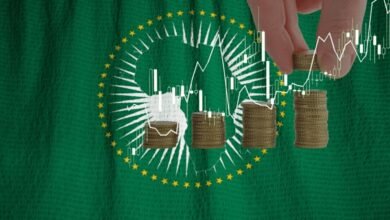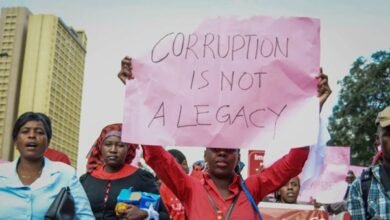Interview Dr Jean Marie Biada: “Competition in Africa prompts Emmanuel Macron to remobilize French companies

On February 27, the day before his official visit to Central Africa, French President Emmanuel Macron outlined his new Africa policy. Among other things, he mentioned the condescension and poor performance of French companies on the continent. Dr Jean Marie Biada, a UNIDO-certified expert in business diagnosis and upgrading, explains the ins and outs of the French leader’s message.
Interview by Bernard Bangda

What is your analysis of the French President’s speech on the condescension of French companies in Africa?
It was a French president who was taken by surprise by the meteoric rise of new powers that had hitherto been absent from the 14 African countries of the Franc Zone, plus the Comoros. The remarkable breakthrough of Russia, India, Brazil, Turkey, Thailand and Vietnam in Africa makes the French economic monopoly obsolete. France is no longer the watchtower and gateway for everything that enters francophone Africa. After 75 years of fruitless cooperation with France, the continent is now diversifying its partnerships.
Vietnam, the main supplier of timber to North America, draws most of its supplies from African forests. In Gabon, where the « One Forest Summit » was held, the Singaporean company Olam has created 50,000 hectares of oil palm plantations whose products are flooding the international market.
During Emmanuel Macron’s visit to Cameroon in July 2022, it emerged that France’s market share had fallen from over 50% in 1990 to 10% in 2022.
The condescension of French companies in Africa was due to their government dictating the terms of trade. Almost all markets were awarded to them without competition. The absence of a public procurement code in several African countries until 2004 perpetuated the ambiguity and influence peddling.
The IMF and World Bank have put an end to this situation. These procurement codes have created competition with countries without a strong history with the continent. Africa, and now President Macron, are finding that the quality of infrastructure delivered by the French has always been poor. This affects their reputation.
The situation was such that Emmanuel Macron could only tell the truth to his country’s companies operating in Africa. They were used to relying on political leverage at the expense of investment quality. In order not to lose face completely, these companies must quickly rethink their position in order to capitalize on the little trust they still have.
“In Africa, French companies still have a monopoly on contracts financed by the French Development Agency (AFD). This is normal”
Has Macron got what it takes to implement his new economic policy for Africa?

As French head of state, he has the means to do so. But on the continent, fewer and fewer people are bowing to the whims of French companies and allowing themselves to be influenced by the Élysée. These companies can no longer evade the tax authorities. Their position in the submissions, where they are rarely in the top three, makes them think twice and question their actions.
However, and this is normal, they still have a monopoly on contracts financed by the Agence Française de Développement (AFD). France can use other partnership levers to maintain its grip on certain sectors.
Following President Macron’s lead, the government can make French companies aware of how to compete in Africa. By improving their competitiveness and marketing products that respond to local realities.
Do you believe in a win-win partnership between sub-Saharan Africa and France?
« It is time for France to redefine its global policy towards Africa. Especially since even Africans trained in France are now refuting the current one”
I don’t think so in the short or medium term. I have every reason to believe that there are nostalgic people in the French state apparatus who still dream of a return of French leadership in sub-Saharan Africa. There are many who do not believe in the mental changes that are taking place in Africa.
But if we digress politically, the attitudes of Mali and Burkina Faso, which were impossible three years ago, should challenge the French political class. Refusing to do business with France means losing market share. Those who now reject the French dictates are denouncing the one-sided standard contracts between their former leaders and the French.

It is time for the French parliament to redefine the country’s overall policy towards Africa. Even Africans educated in French schools no longer see economic policy as France wants it to be. They now have a choice, because the opportunities are as numerous as the natural resources and markets.
In addition, Africa has understood the added value of local processing. There is no longer any question of selling our raw materials (forestry, agriculture, pastoralism, fishing, etc.) in order to buy back finished products that are sometimes 20 times more expensive. But the export of African products goes hand in hand with the export of jobs. It reduces the capacity of African countries to buy on the world market. The economy is therefore blocked by the immobilization of the currency.
« There can be no win-win relationship between France and its former colonies in Africa as long as France continue to fetishize operational accounts”
In the pharmaceutical industry, for example, countries in the Franc Zone have to buy excipients and active ingredients from India. The rupee cannot be used in Africa and the CFA Franc cannot be used in India. Only the operating account in the French Treasury can facilitate such transactions. As long as France continues to fetishize this colonial relic, there can be no win-win relationship between France and its former colonies in Africa.
Such a relationship should start with the abolition of these transaction accounts, so that export earnings are centralized in the treasury accounts of each country. This is where parliamentarians should intervene to persuade the head of state to break this colonial link.






